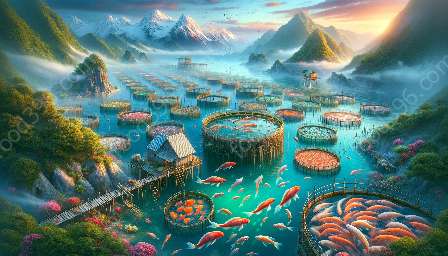Seafood science encompasses various aquaculture practices, and oyster aquaculture is a significant aspect of sustainable seafood farming. Oysters are not only a popular seafood species but also play a crucial role in marine ecosystem maintenance. Let's delve into the world of oyster aquaculture, exploring its techniques, benefits, and its compatibility with broader aquaculture practices.
The Significance of Oyster Aquaculture
Oyster aquaculture refers to the practice of cultivating oysters in controlled environments, such as aquaculture farms, for commercial and environmental purposes. With a history dating back thousands of years, oyster farming has become an essential component of the seafood industry, offering numerous benefits to both the environment and consumers.
Sustainable Practices
Oyster aquaculture promotes sustainability by reducing pressures on wild oyster populations. By cultivating oysters in controlled environments, farmers can manage stock levels, reduce overfishing, and protect natural oyster habitats. Additionally, oyster farming helps improve water quality as oysters are efficient filter feeders, actively removing excess nutrients and particulates from the water.
Benefits of Oyster Aquaculture
Oyster farming provides a consistent supply of high-quality seafood for consumption. Furthermore, oysters are a rich source of essential nutrients, such as protein, omega-3 fatty acids, and various vitamins and minerals. The cultivation of oysters also creates economic opportunities for coastal communities and contributes to the overall growth of the aquaculture industry.
Techniques and Practices
The aquaculture of oysters involves various techniques and practices aimed at maximizing productivity and ensuring the health and quality of the oysters. Farmers employ methods such as bottom culture, floating bag culture, and suspended culture to grow oysters in different environments, adapting to specific coastal conditions and resource availability.
Compatibility with Other Seafood Species
Oyster aquaculture is compatible with the broader practice of aquaculture of seafood species. Oyster farms often operate in conjunction with other aquaculture ventures, such as mussel farming and seaweed cultivation, creating integrated multi-trophic aquaculture (IMTA) systems. IMTA systems harness the complementary relationships among different species to optimize resource utilization and reduce environmental impact.
Role in Seafood Science
Oyster aquaculture is a subject of great importance within seafood science. Researchers and aquaculture specialists work to continually improve oyster farming techniques, develop sustainable practices, and study the ecological benefits of oyster cultivation. This interdisciplinary field combines elements of marine biology, environmental science, and food technology to drive innovation in sustainable seafood production.

